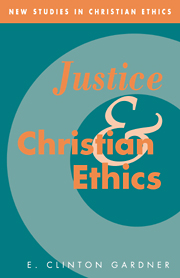Book contents
- Frontmatter
- Contents
- General editor's preface
- Acknowledgments
- 1 Introduction
- 2 The classical tradition of virtue
- 3 The righteousness of God and human justice
- 4 Justice in the Puritan covenantal tradition
- 5 John Locke: justice and the social compact
- 6 The American Republic – a case study: civic virtue and the public good
- 7 Covenant, justice, and law
- Notes
- Select bibliography
- Index
5 - John Locke: justice and the social compact
Published online by Cambridge University Press: 31 March 2010
- Frontmatter
- Contents
- General editor's preface
- Acknowledgments
- 1 Introduction
- 2 The classical tradition of virtue
- 3 The righteousness of God and human justice
- 4 Justice in the Puritan covenantal tradition
- 5 John Locke: justice and the social compact
- 6 The American Republic – a case study: civic virtue and the public good
- 7 Covenant, justice, and law
- Notes
- Select bibliography
- Index
Summary
The last generation of Lockean scholarship has witnessed a radical reappraisal of the traditional interpretation of Locke as a secular political thinker, a defender of individualism, and a champion of the natural right of private property. The new picture of Locke which has emerged through these more recent studies is the result of an attempt to interpret his various writings in their historical context. The appearance of John Dunn's The Political Thought of John Locke in 1969 marked a critical turningpoint in the evolution of the historical approach to Lockean studies. Building upon the work of von Leyden, Laslett, and Abrams, Dunn sought to interpret Locke in terms of Locke's own intentions and self-understanding. The single most important key to a recovery of Locke's own intentionality, Dunn argued, was a recognition of the “centrality” of his underlying religious commitments to his thought as a whole.
Since the appearance of Dunn's essay, the fundamental significance of Locke's religious beliefs for his moral and political thought has been generally acknowledged. Assuming the validity of this hypothesis, Locke's rationalism must now be seen within the framework of his religious convictions. Locke attempted to resolve the tension between the two in terms of the law of nature; but, for him, moral obligation remained ultimately dependent upon religious faith in God as Creator and upon an understanding of humanity as God's workmanship.
In recent years a number of scholars, dealing with particular aspects of Locke's work, have attempted to place his economic and political writings in their historical context.
- Type
- Chapter
- Information
- Justice and Christian Ethics , pp. 80 - 101Publisher: Cambridge University PressPrint publication year: 1995



